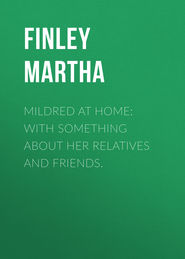По всем вопросам обращайтесь на: info@litportal.ru
(©) 2003-2024.
✖
Signing the Contract and What it Cost
Настройки чтения
Размер шрифта
Высота строк
Поля
“I tried to be a mother to her. I was very fond of her, yet now I can see that I always cared more for my own happiness than for hers – always wanted to be first, and to rule her.
“We lived in Jefferson, Indiana, a mere village, to which the family had removed shortly before the death of our father; he and mother went very near together, both dying of congestive chills. We were left with a little home of our own and a modest competence, and we continued to keep house, a middle-aged woman who had been in the family from the time of my birth matronizing us and taking the oversight of domestic affairs.”
Madame Le Conte paused for breath, and Ethel said softly, “Aunt, you have never told me the family name; it seems odd enough that I should never have heard it – my own mother’s maiden name.”
“Gramont – Nannette and Ethel Gramont we were called, and I have always thought them very pretty names.”
Again the Madame paused for a moment. Her voice trembled slightly as she resumed:
“It was something more than a year after we were left alone in the world that Rolfe Heywood came to Jefferson and opened a dry-goods store. He was a fine-looking, gentlemanly fellow, some twenty three or four years old, I should think, well educated, of agreeable manners, and rather fond of ladies’ society.
“I was pleased with him, and the liking seemed to be mutual. He became a frequent visitor at our house, and soon the girls began to tease me about him. He was said to be paying attention to me, and indeed I think he was at first, and I gave him some little encouragement – not much, for I had several suitors, and was naturally inclined to coquetry; but I liked Rolfe Heywood best of all. I think partly because I was less sure of him than of the others, and that piqued my vanity and pride.
“He did not offer himself, but kept on coming to the house and making himself very much at home there. And so things went on for nearly two years, when all at once I discovered that it was Ethel he admired and wanted. She was seventeen now, and a sweeter, prettier creature you never saw. Ah, my darling little Pansy!”
Tears rolled down the Madame’s cheeks. She hastily wiped them away.
“How did you make the discovery, aunt?” her niece asked in low but eager tones.
“By a look I saw him give her, and which she did not see. It made me furious at him, and I vowed he should never have her. I thought she did not care for him. I kept her out of his way as much as I could, and she made no resistance. But the more obstacles I threw in his way the more eager after her he became.
“At length we learned that he had sold out his business and was going to California, and now my eyes were opened to the fact that Pansy did care for him, she turned so white when she heard the news.
“But I said to myself that it was only a passing fancy, and she would soon forget him. I watched her constantly, and contrived never to allow them to be alone together.
“But one day – the day he was to leave – he called, and found her alone in the parlor. He had not been there ten minutes, though, before I hurried in, pretending to think his call was meant as much for me as for her, and was just in time to prevent a declaration of love which I saw he was beginning.
“It was his last opportunity, and he went away without telling her his feelings or learning hers. He held her hand lingeringly in parting, but I gave him no chance to speak.
“Poor thing! she drooped sadly when he was gone, but I took no notice, saying to myself, ‘She’ll get over it in time.’
“I thought he would write, and he did. I took his letter from the office, deliberately broke the seal, read it (’twas full of passionate love, and would have been a cordial to the poor darling’s fainting heart), and answered with a cold rejection of his suit, imitating my sister’s hand so perfectly that even she could hardly have recognized it as a counterfeit, and signing her name.
“Monsieur Le Conte was paying me attention at this time, having come to the place some months before. He was a handsome, middle-aged man, of courtly manners and considerable wealth. I found his company agreeable, and before we had been acquainted a year we were married.
“He had an intimate friend, a distant relative, Adrian Farnese, who came to see us shortly after our marriage, and who took a violent fancy to Ethel from the first moment he set eyes on her.
“He courted her assiduously, but she turned coldly from him and rejected his addresses again and again, much to my husband’s annoyance and mine, for we both liked Adrian and desired the match.
“I undertook to reason with Ethel, saying everything I could think of in Adrian’s favor. She heard me in sad silence, and when at last I insisted upon her giving me a reason for her persistent rejection, she burst into tears, crying out, ‘Oh, how can I marry him when my heart is another’s?’
“Then I twitted her with giving her heart unasked, said I knew it was to Rolfe Heywood she had lost it, but he didn’t care for her now, if he ever had; that was plain enough from his silence. No doubt he had found a new sweetheart by this time – perhaps was already married.
“My poor little Pansy never answered back a word, but cried as if her heart would break.”
The Madame’s voice broke. She stopped, buried her face in her handkerchief, and sobbed aloud. Tears were stealing down the cheeks of her listener also, and for a moment neither spoke.
Then the Madame resumed her narrative:
“As I said before, Ethel and I were very different – she so gentle and yielding, so ready to think others wiser than herself; I proud and wilful, always made more determined by opposition. I resolved that she should marry Adrian Farnese.”
“Oh, how could you be so cruel?” cried her listener.
“Ah, try not to hate me! I have suffered terribly for my fault, as you shall learn presently,” said the Madame in piteous tones. “But how shall I tell of all my wicked unkindness to that poor child! I wrote a notice of the marriage of Rolfe Heywood, giving a fictitious name to the bride, and sent it to a paper published in New York. I was a subscriber, and when the number with the notice came I showed it to Ethel, saying, ‘You see I was right. Rolfe Heywood cared nothing for you, and is already united to another.’”
“She turned deathly white, seemed about to faint, but recovering herself a little, hastily left the room.
“‘Now,’ I thought, ‘she will presently give up and marry Adrian.’ But she would not hear of it, and avoided him whenever she could without absolute rudeness.
“‘No, she’ll never give up while she knows Rolfe Heywood is alive,’ I said to my husband one day.
“‘Then we must make her believe him dead,’ he answered.
“I was afraid to publish a false report of his death, but we got one printed on a slip of paper that had the appearance of having been cut from a newspaper, and I gave it to my sister. She swooned, and looked so deathlike, seemed so utterly crushed for days and weeks afterward, that I could scarcely refrain from telling her the whole truth. But the fear of my husband’s displeasure, and the thought that if I did Rolfe Heywood would get her after all, restrained me. So I kept my secret, and tried to make all other amends in my power by being very kind and sympathizing.
“Ah, her gratitude for it was quite touching – almost harder to withstand than her grief!
“She seemed gradually to recover from the shock, but was never again the light-hearted, merry creature she had been before Rolfe Heywood went away.”
“And she learned at last to love – ?” Ethel broke off without pronouncing the name.
“She finally gave up to us and married him,” sighed the Madame. “How much she loved him, if at all, I do not know. I tried to believe her not unhappy, and she made no complaint.
“However, they had not been married many months when a fierce quarrel arose between our husbands. It was about some money matters. I never fully understood it, but I then learned for the first time that it was more Pansy’s little fortune Adrian wanted than herself, and that Monsieur Le Conte’s influence was used in his favor because they had agreed that in that way he should cancel a debt owed to Adrian. Had I known this I would never have let them use me as their tool.”
“And he was my father!” murmured Ethel in a pained tone.
“Yes, child, and you might justly hate me for giving you such a one!” exclaimed the Madame almost passionately. “I’m afraid he was a bad man. I fear he was unkind to my sister; but she was loyal to him, poor thing.
“When the quarrel arose between him and Monsieur Le Conte I sided with my husband, and went to Ethel with his version of the affair; but she would not listen to me.
“‘I am his wife now,’ she said; ‘I will hear nothing against him. And you, Nannette, who brought about the match, should be the last to tempt me to do so.’
“I was very angry, and heaped bitter reproaches upon her,” pursued the Madame, almost overcome by emotion. “She heard them in grieved silence, which somehow only exasperated me the more, and I said still harder and more cruel words. And so I left her.”
For some minutes the room was filled with the sound of the Madame’s sobs, and Ethel wept with her.
“It was our last interview,” she began again in a broken voice. “A few days later her husband spirited her away no one knew whither, and from that day to this I have never heard a word from her or about her, except what I have learned through you – her child.
“I have now told you of my crime; I have yet to tell of its punishment. In spite of all my unkindness, I loved my sister; how dearly I never guessed till she was gone. I was nearly frantic at her loss, and at the thought of my last words to her.
“The world went prosperously with us so far as money was concerned. My husband invested my little fortune and his own partly in an oil-well, partly in a gold-mine in California, and we were wonderfully successful in both. But we were not happy. Remorse and anxiety about Pansy made me wretched and robbed me of my vivacity and my bloom. I grew dull and spiritless, and my husband began to neglect me and to seek the society of other women, whom, as he said, he found more entertaining.
“I sought forgetfulness in dress and all sorts of dissipation. I could not bear to be alone; but sometimes Monsieur Le Conte’s business would call him away for days and weeks together. I had no child, and I could not always go out or contrive to have company in the house; and so at times I would try to drown my misery in the wine-cup.
“I did not become a drunkard, but two or three times I drank to intoxication.”
She paused, and, with a downward glance at her mutilated limb, sighed heavily.











